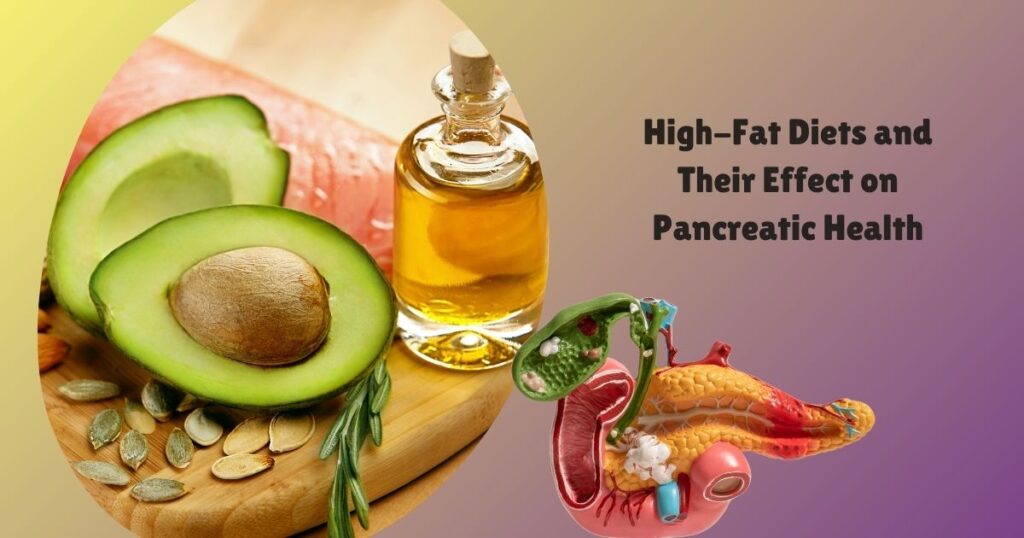Our pancreas plays a vital role in preserving general health by producing insulin to control blood sugar levels and secreting digestive enzymes to facilitate digestion. The condition of this essential organ may be greatly impacted by the things we eat. A number of pancreatic problems, ranging from inflammation to an elevated risk of pancreatic illnesses, such as pancreatitis and pancreatic cancer, have been associated with high-fat diets. Let us discuss the impact of a high-fat diet on pancreatic health and strategies to reduce these hazards in this blog.
Understanding the Role of the Pancreas
The pancreas is a multipurpose organ that carries out both exocrine and endocrine tasks:
- Endocrine Functions: Insulin and glucagon, which control blood sugar levels, are produced by the pancreas.
- Exocrine Functions: It releases digestive enzymes that aid in the breakdown of proteins, lipids, and carbs, including lipase and amylase.
That is why a diet that is heavily loaded in fat, can overload the pancreas, impairing its function and perhaps cause health issues.
How High-Fat Diets Affect the Pancreas
-
Increased Risk of Pancreatic Inflammation
Pancreatitis is a chronic inflammation of the pancreas. It needs to be understood that this condition can be brought on by a high-fat diet. Overconsumption of dietary fats puts extra strain on the pancreas by forcing it to create more digesting enzymes. There is an ongoing stress on the pancreas due to this. If the condition persists, it can eventually lead to either acute or chronic inflammation, which can cause pain, digestive problems, and other problems.
-
Contribution to Obesity and Insulin Resistance
Obesity is a known risk factor for pancreatic dysfunction. It is a known fact that high-fat diets are generally high in calories. Insulin resistance is linked to excess body fat and more importantly visceral fat found in the abdominal region. Insulin resistance increases the likelihood of type 2 diabetes and further compromises pancreatic function by making it more difficult for the pancreas to control blood sugar levels.
-
Potential Link to Pancreatic Cancer
Some research says that long-term high-fat diet intake may raise the risk of pancreatic cancer. Excessive dietary fat can trigger the production of certain hormones and inflammatory markers that could encourage the establishment of pancreatic tumors. This link emphasizes the need of a balanced diet for pancreatic health. However additional research is required to establish this.
Signs of Pancreatic Stress
Further difficulties can be avoided with early diagnosis of pancreatic problems. The following are some of the signs and symptoms associated with pancreatic stress:
- Abdominal pain or bloating after high-fat meals
- Nausea or vomiting
- Sudden weight loss
- Difficulty digesting fatty foods (e.g., greasy stools)
If you are experiencing any of these signs and symptoms, consult a healthcare professional immediately.
Ways to Protect Pancreatic Health
Better lifestyle choices can promote pancreatic health and lessen the health dangers that are associated with a high-fat diet.
-
Make Dietary Changes
- Give priority to whole foods, such as lean proteins, whole grains, fruits, and vegetables.
- Limit trans fats (found in processed and fried meals) and saturated fats (found in red meat and full-fat dairy).
- Include healthy fats from foods like avocados, nuts, seeds, and olive oil.
-
Drink plenty of water
Apart from helping with digestion, water lowers the chance of gallstone formation, which can clog the pancreas and cause inflammation.
-
Regular and Consistent Exercise
Exercise supports pancreas function by lowering the risk of insulin resistance and assisting in maintaining a healthy weight. So being a regular in doing exercise aids in long term health
-
Restrict Your Alcohol Use
One of the main risk factors for pancreatitis is excessive alcohol use. The strain on your pancreas can be considerably lessened by cutting back on alcohol or quitting alcohol for good.
Diets high in fat can have a significant effect on the health of the pancreas. They can increase the risk of insulin resistance, inflammation, and even pancreatic cancer. Any diet is complete only with diet fats but it’s crucial to emphasize moderation and quality. A healthy pancreas and long-term wellbeing is supported if we prioritize a balanced diet full of nutritious foods. Moderate exercise, and good lifestyle choices are other parameters that promote pancreatic health apart from food. For individualized guidance, speak with your doctor if you have concerns about your diet or pancreatic health.
